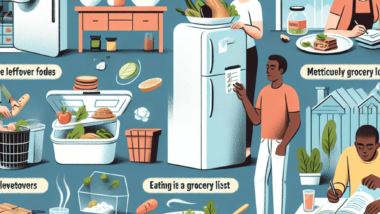How to Lessen Your Environmental Impact by Cutting Down on Food Waste
Imagine a world where 1.3 billion tons of food, enough to fill a line of trucks stretching from New York to London, is wasted every year. That's the world we live in!
This eye-opening figure highlights a pressing global issue that demands our attention and action. By recognizing the far-reaching effects of food waste, we can take significant steps towards fostering a more sustainable future, both individually and within our communities.
What You Will Learn
- Food waste accounts for about one-third of all food produced globally, underscoring the scale of this issue.
- Around 820 million people face hunger each year, highlighting the contradiction of food waste amidst food insecurity.
- Food waste (including in the supply chain before it goes on-sale) contributes to 8-10% of global greenhouse gas emissions, with decomposing food in landfills producing harmful methane.
- Implementing small, actionable changes—like composting or sharing surplus food—can create a ripple effect that significantly reduces waste.
- Engaging in community efforts—such as organizing workshops and food swap events—can amplify the impact of individual actions against food waste.
- Adopting strategies like meal planning and understanding expiration dates can help households reduce food waste effortlessly.
- Continuing the conversation about food waste raises awareness and fosters a culture of sustainability in communities.
- Everyone can take part in food waste reduction initiatives by volunteering, advocating for supportive policies, and sharing their own stories and tips.
Understanding the Environmental Impact of Food Waste
Global Statistics on Food Waste
The Alarming Scale of Food Waste
Food waste is a serious issue that affects everyone on the planet. Currently, approximately 1.3 billion tons of food is wasted each year! This is about one-third of the food produced globally, which is not only shocking but also wasteful in terms of resources.
When we think of all the energy, labor, and water that goes into producing food, it becomes clear that wasting such a large amount has devastating impacts. For instance, around 50% of fruits and vegetables produced are thrown away before they even reach consumers! This massive waste isn’t just a number; it represents lost opportunities to feed those in need.
Consequences of Food Waste on Hunger and Food Insecurity
The consequences of food waste extend beyond just numbers; they deeply affect hunger and food insecurity. Every year, about 820 million people face hunger, while so much food is being discarded! It’s a stark contradiction that needs our attention.
Reducing food waste can help alleviate hunger by redirecting surplus food to those who need it. By minimizing waste, we can make a significant contribution toward solving food insecurity in our communities.
The Environmental Footprint of Food Waste
How Food Waste Contributes to Greenhouse Gas Emissions
Food waste isn’t just an economic problem; it also has a huge environmental footprint. When food rots in landfills, it produces methane, a greenhouse gas that is more harmful than carbon dioxide! This contributes to climate change, making food waste a pressing environmental issue.
A staggering 8-10% of global greenhouse gas emissions come from wasted food. Addressing this issue is critical for our planet's health and sustainability.
The Role of Landfills in Environmental Degradation
Landfills are a significant part of the food waste problem, as they contribute to environmental degradation. When food waste decomposes in landfills, it not only emits toxic gases but also leaches harmful substances into the soil and groundwater. This can have devastating effects on local ecosystems.
Reducing food waste can lessen the burden on landfills and promote a healthier environment. By finding better ways to manage and use food resources, we can create a more sustainable future.
Making a Positive Difference: The Collective Effort Against Food Waste
Individual Actions Leading to Global Change
The Ripple Effect of Personal Responsibility
Each of us has the power to make a difference when it comes to food waste! By being mindful of our actions, we can inspire others to join the cause. Simple changes in our daily routines can lead to a massive positive impact.
How Small Changes Can Lead to Big Impact
Implementing small changes can create a ripple effect in our communities. Here are a few ideas:
- Composting food scraps instead of throwing them away.
- Sharing surplus food with neighbors or friends.
- Choosing smaller portions when dining out.
- Regularly checking your fridge for items nearing expiration.
Encouraging Community Involvement
Building Local Networks for Food Waste Reduction
Communities can come together to tackle food waste effectively. Building local networks can help spread awareness and share resources. Here are some steps to consider:
- Organize community workshops on food preservation.
- Start a neighborhood composting group.
- Host food swap events to exchange excess food.
- Collaborate with local farms to utilize unsold produce.
Celebrating Success Stories and Innovations
Recognizing the efforts of individuals and groups can motivate others to take action. Sharing success stories can highlight effective strategies. Here are some ways to celebrate:
- Showcasing local businesses that reduce food waste.
- Highlighting community members who make a difference.
- Sharing innovative solutions through social media.

Embracing a Sustainable Future Through Food Waste Reduction
Key Takeaways for a Sustainable Lifestyle
Essential Strategies for Every Household
Adopting sustainable practices at home can be easy and rewarding. Here’s a list of essential strategies to consider:
- Plan meals to avoid overbuying groceries.
- Understand expiration dates to manage food effectively.
- Use creative recipes to make the most out of leftovers.
- Engage family members in food waste reduction efforts.
Continuing the Conversation Around Food Waste
It’s important to keep talking about food waste issues. Engaging in discussions helps break the stigma around food waste and promotes solutions. Here are some ideas:
- Host community forums to share ideas and solutions.
- Start a blog or social media page dedicated to food waste reduction.
- Encourage schools to incorporate food waste education into their curriculum.
Join the Movement: Your Role Matters
Steps to Get Involved in Food Waste Reduction Initiatives
Everyone can contribute to reducing food waste in meaningful ways. Here are some steps you can take to get involved:
- Research local food banks and donation programs.
- Volunteer your time at community gardens or food rescue organizations.
- Advocate for policies that support food waste reduction.
- Participate in events focused on sustainability.
Inviting Readers to Share Their Stories and Tips
Your experiences can inspire others! I encourage you to share your own tips and stories related to food waste reduction. Here are some ways to do that:
- Post on social media with the hashtag #FoodWasteWarrior.
- Join online forums dedicated to sustainable living.
- Write an article or letter to your local newspaper.
Reducing food waste is crucial in lowering our environmental impact and creating a more sustainable food system. There are several simple yet effective ways in which individuals can contribute to this cause.
5 Ways to Reduce Your Food Waste Environmental Impact
1. Meal Planning
One of the key steps in reducing food waste is proper meal planning. By planning meals ahead of time and creating shopping lists based on what you actually need, you can avoid buying excess food that may end up going to waste. Additionally, storing food properly can help extend its shelf life and prevent spoilage.
2. Portion sizes
Another important strategy is to be mindful of portion sizes. Serving appropriate portions can help prevent overeating and reduce the amount of leftover food that often goes uneaten. Leftovers should be stored properly and consumed promptly to avoid spoilage.
3. A Greener Future: The Power of Composting
Composting is a fantastic way to give your food scraps a second life. Instead of sending them to the landfill, turn them into nutrient-rich soil for your garden. It's a win-win! Not only does it reduce waste, but it also helps to cut down on harmful greenhouse gas emissions.
Composting is a form of biological processing that turns a waste into a useul output or product. Another way to biologically process uneaten food, and food scraps, but this time one that produces energy and renewable fertilizer is the anaerobic digestion of food waste.
4. Sharing the Love: The Joy of Food Donation
Do you have excess food that's just too good to waste? Why not share it with those who need it most? Donating food to local shelters or organizations is a wonderful way to help others and reduce food waste. It's a simple act of kindness that can make a big difference.
5. Spreading the Word: The Importance of Awareness
Let's spread the word about the importance of reducing food waste! By educating ourselves and others, we can inspire positive change. Share tips, organize community events, and encourage everyone to take action. Together, we can create a more sustainable future, one bite at a time.
Concluding Reducing Food Waste for a Brighter Tomorrow and a Sustainable Future
By making small changes in our daily lives, we can have a significant impact on the environment. Let's embrace sustainable practices like meal planning, portion control, composting, and food donation. Every little bit counts. Together, we can build a world where food waste is a thing of the past and sustainability is a way of life.



